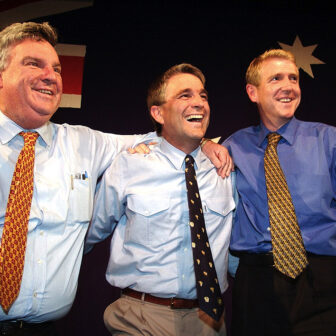Over the past few weeks Anthony Albanese has cobbled together a team of staffers untainted by any association with his predecessor’s regime. Just last week he poached the Australian’s popular “Strewth” columnist, James Jeffrey, to be his speechwriter. As chief of strategy he has reportedly gone back to the Gillard years, taking on her old cabinet director, Mathew Jose. Sabina Husic, sister of Labor MP Ed Husic, has been brought in as deputy chief of staff, having worked for several Labor premiers but mainly with the lobbying firm of NSW Liberal powerbroker Michael Photios.
But perhaps the most interesting hire so far is the new leader’s chief of staff, Tim Gartrell, once Mr Kevin07 but largely out of Labor’s orbit in recent years. Way back, Gartrell was a young party apparatchik from the NSW left who worked for unions, was a staffer for junior Keating government ministers, and even managed Albanese’s first campaign in 1996. By the early 2000s he had reached the commanding heights of the Labor machine, first as assistant national secretary and then as national secretary and campaign director for the federal elections of 2004 — Mark Latham’s failed bid — and 2007, the triumphant Kevin07 election.
Fresh from that victory, he retired as national secretary in 2008 and ended what had been a lifetime as a Labor professional. For the past eleven years he has been freelancing in the private and non-profit sector: for Andrew Forrest’s Aboriginal employment company, Generation One; for Recognise, the organisation working for constitutional recognition of Indigenous Australians; and, most recently, for the official Yes campaign in the marriage-equality survey.
Gartrell returned to the party fold in 2017 in a somewhat ceremonial capacity, taking the position of vice-president of the NSW branch. Apart from that, he hasn’t been a Labor machine man for a solid decade now. Bringing him back after all this time suggests that Albanese sees something special in him — and not just his lack of ties to the Shorten era. What might that be? What is so distinctive about Gartrell as a campaigner? What does his selection tell us about the kind of leader Albanese wants to be?
Perhaps the most obvious thing about the new chief of staff is his rhetorical style. Whether he’s at the helm of the Labor machine or outside it, Gartrell’s campaigns tend to be optimistic and non-threatening in tone. As he told the Sunday Mail in 2000, he is not a “kick-the-door-down type of guy.” When Mark Latham looked for people to blame for Labor’s 2004 loss (not himself of course — he had “won the campaign,” he told his diary), he singled out Gartrell as the man who blew it, suggesting he went soft on TV attack ads and failed to warn him about the Coalition’s devastating interest rates scare campaign. Essentially he felt Gartrell was too nice — that he failed to attack and failed to anticipate enemy attacks.
While Gartrell denies he failed Latham strategically, it’s widely accepted he kept the gloves firmly on in 2004, and they stayed on in 2007. Though it went a little more negative that year, targeting Peter Costello and WorkChoices, Rudd’s campaign was, like Latham’s, overwhelmingly hopeful — focused on the future, on “new leadership.” It was the same at Recognise and for marriage equality, and even for his own campaign for the NSW Labor vice-presidency. The messaging was about warm fuzzy feelings, about love and dignity and hope — the sunlit uplands — rather than searing injustice, rights violated or threats to be tackled.
If Liberal strategist Sir Lynton Crosby is the grand master of the dark arts, the Voldemort of Australian campaigning, then Gartrell is the Harry Potter — positive and earnest, perhaps to the point of naivety. If he is true to form and he has any impact on his new boss, we will hear less “politics of envy” from Anthony Albanese and more of the “brighter days lie ahead” talk.
Then there is what we might call the man’s campaign philosophy, a more complicated legacy to assess. It seems pretty clear from the flavour of his campaigns, and from his public observations about them, that he believes electoral politics boils down to having an effective salesperson as leader. When he was asked about the difference between the failure in 2004 and the smashing success in 2007, he told the Courier Mail simply that Kevin Rudd was not Mark Latham. The campaign strategy, the tactics, the rhetoric, the staff — most of that reportedly went unchanged. What mattered was having the right leader, one who could cut through, who could perform for the media, who could tickle the polls, who felt fresh.
Of course, leaders have been increasingly important in Australian political campaigns for the past fifty years, but in the 2000s, and especially in NSW Labor, the obsession reached fever pitch. Leaders were seen not just as important but as totally dominant factors in electioneering. Every aspect of their performance came under intense scrutiny. To win, they had to perform perfectly. If they grew unpopular, or stumbled in the media or in the polls, they simply could not be tolerated; their stumbles could take the whole party down with them.
This attitude would later come to be portrayed as the New South Wales disease, for it was the young NSW machine men — Mark Arbib, Karl Bitar and, yes, Tim Gartrell — who seemed to bring this obsessive leadership focus into vogue for Labor. Paul Keating would refer to Gartrell, along with several other senior campaigners of the era, as “conservative tea-leaf-reading, focus group–driven polling types” who were “frightened of their own shadow and won’t get out of bed in the morning unless they’ve had a focus group report to tell them which side of bed to get out.”
Certainly, they polled and polled again on the popularity of their leaders, disposing of them with great frequency. During Gartrell’s nine years in the upper ranks of Labor HQ, the party dumped Kim Beazley for Simon Crean, Crean for Latham, Latham for Beazley, and Beazley for Rudd.
Again and again, Labor officials were intimately involved in changes that had traditionally been the preserve of MPs. Gartrell appears to have been one of the men giving leaders that tap on the shoulder, showing them the terminal polling, suggesting they may want to make way for a more popular candidate. In 2006, Gartrell’s polling-influenced doubts about Beazley’s leadership found their way into the media in November and kicked off the push that saw Kevin Rudd roll Beazley by Christmas.
At the time Gartrell backed Beazley publicly, but he later told the Sydney Morning Herald that he had been convinced as early as July 2006 that ol’ Bomber couldn’t win the next election. Behind the scenes, Labor HQ was running polls to test Rudd’s popularity. Some of that polling found its way into the media — and, again, Gartrell was forced to deny that the national office had leaked it.
By election night in November 2007, that focus on getting the right leader, no matter the cost, looked to have paid off. Kevin Rudd was admonishing the party to enjoy a quick Iced VoVo and prepare to govern the following morning. It was the first time Labor had won power from opposition since 1983, and a humiliating loss for prime minister John Howard, supposedly the great political master, who was also ousted from his own seat. Tim Gartrell could retire from the Labor Party machine on a high.
He was no longer around, then, when the whole thing fell apart — when Labor discovered it was not beyond ousting sitting prime ministers, just as it had dispensed with opposition leaders. Perhaps the earliest warning sign should have been the removal of NSW premier Morris Iemma in 2008, and then, just over a year later, of his successor Nathan Rees, using methods honed by Labor in opposition at the federal level. It was tough confirmation that holding the responsibilities of office did nothing to inoculate the party against the ravages of the NSW disease.
But the warning was not picked up, and the coup culture consumed the Rudd government and the Gillard government, then spread across to the Coalition, felling prime ministers Abbott and Turnbull. For the decade since Kevin Rudd took office in 2007, no prime minister has served out a term. As Malcolm Turnbull said upon his own ousting, it is a kind of madness.
If Tim Gartrell was one of the brilliant architects of the Rudd victory in 2007, then surely he must also take some of the responsibility for the madness that came afterward. Either he opposed the polling mania, the cult of the leader, and the coups and was utterly ineffective in his efforts, or he condoned them. And presumably, the opposition leader hasn’t hired Gartrell because he thinks him ineffective.
Which suggests that Albanese has sought out Gartrell because he thinks he can help him become a marketable, likeable, election-winning leader just like Kevin Rudd once was. It follows that he shares Gartrell’s view that elections are about having a likeable, responsive leader — and that Bill Shorten simply failed to tap into the public mood. With a better, more marketable leader, Labor can win.
If that is indeed his thinking, Albanese is ignoring the dark side of the Kevin07 legacy. That kind of campaign ate away at the public’s trust in the system and eviscerated political capital for every leader to come after it. Bill Shorten was not unlikeable because he was insufficiently responsive to the public mood — he was unlikeable because he appeared to be trying too hard to please us. People didn’t believe his promises, whether they agreed with them or not. That distrust partly sprang from Shorten’s role in the Rudd–Gillard–Rudd saga, but it also came from the more general stink wafting off major-party politicians.
To make inroads there, Anthony Albanese needs to work hard at appearing transparent and authentic. Flip-flopping, hesitating, being a focus group windsock, telling people only what they want to hear — maybe, this week or that, it will give Labor a bump in the polls, but it will undermine his own leadership in the medium term, just as it has done for all leaders of late.
The real task is to change minds, to engage in some hard persuasion. That might poll terribly at first — it would mean ignoring that feedback and pressing on, at least for a while. For someone like Tim Gartrell that means throwing out the playbook that made him a success last time he was at the top of the Labor machine. Maybe he can do that, but it would mean learning a whole new way to do things, and with brutal scrutiny and a tight timeline all bearing down on him. Perhaps it is a good thing the man is an optimist. •




